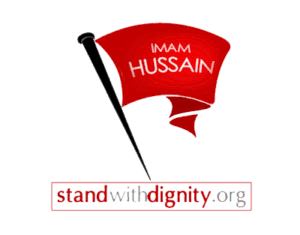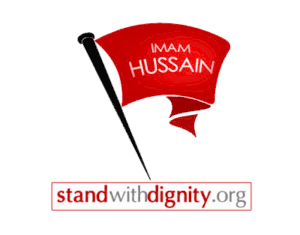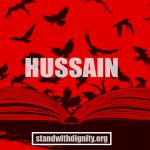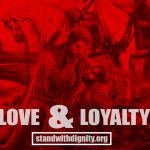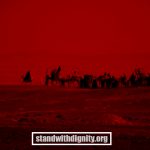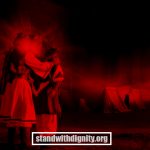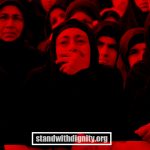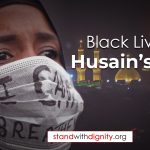By Mrs. Umm Hussain
This article is dedicated by the writer, Umm Hussain, a Scottish Muslim, to the memory of Ayatollah Muhammad Baqir as-Sadr who remained true to the teachings of his Master Imam Hussain, peace be upon him, and following in his beloved footsteps gave up his life in the struggle for truth. May his sacrifice inspire the living to ceaselessly strive against the powers of evil whenever and wherever they arise.
The battle of Imam Hussain and Yazid is the relentless battle between the higher and lower nafs waged daily in the hearts of men, the eternal Karbala of the self. As we enter the month of Muharram, Muslims the world over remember the martyrdom of Imam Hussain and keep the Ashura, the anniversary of his death, as a day of solemn mourning. But what is the use of the wailing and the beating of breasts if the memory of Imam Hussain is buried in emotionalism conveniently separated from our lives in a world where daily the heirs of Imam Hussain struggle against modern Yazid’s. If his death is to have any meaning for us today we must ask ourselves, who was this man? Why did he die? What did he teach us?
Contemporary documentation is clear on the following facts: on the 10th of Muharram 61 A.H. (9th October, 680 A.D.) at Karbala, Iraq, Hussain, beloved grandson of the Prophet Muhammad, second son of Amirul-Mu’minin Ali ibn Abu Talib and Fatima Zahra, was slaughtered along with many of his family and close followers by the armies of Yazid b. Muawiyah, self-styled Caliph of Islam. The reason for Imam Hussain’s death was his refusal to acknowledge and pay homage to Yazid, a notorious debauchee who openly flaunted the laws of Islam, and the leader of the Muslim world.
The issue at stake was not an isolated conflict between two men of differing ambitions and viewpoints but the resolution of that key question which is still a matter of contention today – what manner of man has the right to rule the Muslim world, the spiritual heir of the Prophet or one of worldly strength and power? Are men to be led by the light of Muhammad or by brute force? Can there be a split between the secular and spiritual in light of the knowledge of tawhid (unity) which permeates the teachings of the Prophet? Can a man place himself at the mercy of a temporal ruler when his only allegiance is to Allah? This split was unacceptable to Imam-Ali and to his sons, Hasan and Hussain, peace be upon them all.
When the Prophet addressed the people at Ghadir-Khum on the return journey from his last Hajj, it is recorded that he said: ‘I leave behind amidst you two great things, the Book of Allah and my Ahlul-Bayt (the Prophet’s family). Should you be attached to these two, never, will you go astray from me, for verily these two will never part company until they both meet me at the Spring of Kawther (Paradise)”. Then he continued: “The Lord, Allah Almighty, is my Master and I am the master of every true believer.” And taking the hand of Imam Ali in his hand he raised it, and over the vast assembly declared: “He is the master of all those whose master I have been. O Allah love those who love ‘Ali and hate those who hate him.”[1]
The love of the Prophet for Imam ‘Ali is illustrated by many hadiths (traditions), chief among them are the following:
“Ali and I are of one and the same Divine Light.”
“I am the City of Knowledge and Ali is its Gate.”
“O Ali! You are my brother in this world and the next.”
“O Ali! You are to me as Aaron was to Moses, save that there is no prophet-hood after me.2
Yet three times Imam ‘Ali was passed over and the caliphate moved to Abu Bakr, then ‘Umar, then ‘Uthman. On each occasion Imam Ali decided against fighting for the caliphate despite his firm conviction that he was the rightful successor to the Prophet. His dedication to the continuation of unified Islam was such that he could not instigate any internal conflict which might destroy the young and vulnerable Muslim community. Rather he elected to retire from public life, helping the caliphs whenever necessary in the interests of the people, and refusing to lead any rebellions against them. The favoritism shown by ‘Uthman to his relatives, the Bani Umayya, and to certain of the wealthier families connected with them, had caused much hatred against him finally a violent mob besieged his (‘Uthman) house. Although Imam Ali sympathized with the complaints against ‘Uthman he had played a key mediatory role. He even placed his sons, Imam Hasan and Imam Hussain, guarded outside ‘Uthman’s house to protect him. The mob, however, overpowered them and gaining entry to the house murdered ‘Uthman. When Imam Ali heard the news he rushed to the scene of the murder.
The people begged Imam Ali to accept the caliphate. To this he reluctantly agreed being fully aware that his enemies would then accuse him of complicity in the murder of ‘Uthman. As he expected, Muawiyah b. Abu Sufyan, Governor of Syria, used his relative’s murder as an excuse to question the validity of Imam Ali’s appointment, and demanded vengeance on ‘Uthman’s murderers. Muawiyah, a strong and capable administrator, had been appointed as Governor of Syria by ‘Umar, his position endorsed by ‘Uthman. The son of the Prophet’s old opponent Abu Sufyan, he had forged a considerable power base for himself in Syria, and now cherished ambitions to seize the caliphate for himself and his family. He also feared that once Imam Ali had consolidated his own position the latter would try to remove the Syrian governorship from his hands. The forces of Imam Ali and Muawiyah met at the indecisive Battle of Siffin, but before a more final confrontation could take place Imam Ali was murdered in the mosque at Kufa on 21 Ramadan 40 A.H. (25th January, 661A.D.).
Imam Hasan, the eldest son of Imam Ali was proclaimed caliph by 40,000 people in Kufa after his father’s murder. Muawiyah immediately denounced his appointment. Through bribery and his extensive espionage network he worked to undermine Imam Hasan’s position. Then with an army of 60,000 men, Muawiyah began a slow march against the Caliph. He had no desire for a swift confrontation as it was not in his interests to defeat Imam Hasan in battle or kill him at this juncture, as the latter’s death would simply mean the emergence of another contender from the Ahlul-Bait. His scheme was rather to induce Imam Hasan to abdicate in his favor, thereby giving some legal validity to an otherwise tenuous claim. In a letter written to Muawiyah at this time. Imam Hasan argued his family’s claim to the caliphate on the grounds of the Ahlul-Bayt’s position as the spiritual heirs of the Prophet from whom the authority of the caliphate sprung. In his reply Muawiyah did not deny the Prophet’s family’s exalted position in Islam but rather defended his claim on the premise that practical experience rather than spirituality was the necessary qualification for the leadership of the community and that the caliph should be a man whose political and military strength enabled him to preside over the expansion of the Muslim empire.
The vacillating Iraqis who had been the first to acclaim Imam Hasan proved easily amenable to Muawiyah’s bribes, and the caliph’s position was soon threatened from within. In the ensuing confusion, Imam Hasan decided that in order to avoid further bloodshed he should abdicate in favor of Muawiyah on condition of the latter’s acceptance of the following treaty which Muawiyah duly agreed to:
- That Muawiyah should rule strictly according to the Holy Qur’an and the Sunna of the Prophet.
- That Muawiyah should not appoint or nominate anyone to the caliphate after him, but that the choice should be left to the Muslim people.
- That the people will be left in peace, wherever they are in the land of Allah.
- That the persecution of the Shi’as, the followers of Ali, should immediately be stopped, their lives, properties and families guaranteed safe conduct and peace.
- That no harm should be done secretly or openly against Imam Hasan, his brother Hussain or any of the Ahlul-Bayt.[2]
Imam Hasan’s sole concern was the continuation of pure Islam. He realized that battle with Muawiyah would probably end in defeat and the slaughter of many of the strong Shi’as. For this reason he gave up a position which was only meaningful to him to guide people towards Allah. His sacrifice was patience and forbearance in adversity, his achievement to preserve the Shi’a movement as a living entity, albeit undercover, until a time when strengthened and expanded it might rise again.
The Imam retired to Medina to lead a life of prayer and teaching. However, Muawiyah plan to secure the succession of the caliphate for his son Yazid required that Imam Hasan predecease him. He therefore bribed one of the Imam’s wives, Ju’da bint al-Ash’ath, to poison him in 40 A.H. (669 AD.). The Shi’as of Kufa then acclaimed his brother Imam Hussain as his successor and invited him to lead them against Muawiyah. Imam Hussain, peace be upon him, honoring his brother’s treaty with Muawiyah, refused to accept their offer and told them to stay at peace so long as Muawiyah ruled.
Insofar as the jihad of Imam Hasan lay in the path of restraint, so the destiny of his brother Imam Hussain was played out against the field of action. Two sides of the same coin, the Hasanayn (the two brothers) shared the blessing of close proximity to their grandfather, the Prophet, during the early years of their childhood. Many stories are told of the loving companionship bestowed upon the boys by Muhammad, may Allah bless him and his family and grant them peace, who called them, “Chiefs amongst the youths of Paradise.” The Prophet is reported to have said, “Hussain is of me and I am of Hussain.” Shaikh Saduq reports from Huzaifa Yamani, “I saw the Holy Prophet holding the hand of Hussain and saying. ‘O people! Know this Hussain, son of Ali and Fatima, know that by the One (Allah) in whose hand is my soul, that he (Hussain) is of heaven, and his friends will be the inmates of heaven’”.
Here was a man raised in the very cradle of Islam; his life dedicated from birth to Allah, knowing nothing but the path of service. Various hadiths (traditions) corroborate that the Prophet and the Ahlul-Bayt, including Imam Hussain himself, were aware of his future martyrdom. His whole life was but a preparation for the appointed time when it was incumbent upon him to make the supreme sacrifice of the lives of himself, his family and friends. With the death of Muawiyah this time had arrived.
On Muawiyah’s death his son Yazid was proclaimed caliph, thanks to the former’s strong military control of the Muslim world and the carefully placed bribes by which he had attempted to secure Yazid’s succession. The so-called ‘Commander of the Faithful’ was a notorious reprobate whose public wine-drinking and licentious behavior has never been denied by any historian. Despite the acknowledgment by the tribes of the Muslim empire, Yazid was aware that his title was not secure until he had received homage from the four most respected men of Islam, who were all sons of the Companions of the Prophet. These were Imam Hussain, Abdullah b. Zubair, Abdullah b. ‘Umar, and Abdur- Rahman b. Abu Bakr. Despite many attempts, Muawiyah had been unable either with bribes or coercion to secure their support to his son’s succession. As soon as his father was dead Yazid sent a messenger to al-Walid b. ‘Utba, the Governor of Medina, commanding him to extract homage from these four men, particularly Imam Hussain, peace be upon him, who should be killed if he refused. The Governor duly summoned Imam Hussain in the middle of the night. Realizing that this urgent summons must mean Muawiyah was dead, the Imam took a contingent of his supporters with him to the Governor’s palace, as a protective measure. When the Governor asked him for homage, Imam Hussain replied that for an act of homage to be valid it must be made in public, therefore the people should be summoned to the mosque the next day, and he would ask their counsel as to whether he should pay homage to Yazid. Marwan b. al-Hakam, an old enemy of Islam who had been expelled from Medina previously by the Prophet, advised Walid to murder Imam Hussain on the spot rather than let him leave the palace without having taken the oath of allegiance. Walid, who was sympathetic to Imam Hussain, would not do this and Imam Hussain left him in safety. Two days later accompanied by most of his family and close supporters he migrated to Mecca.
Once in Mecca Imam Hussain, peace be upon him, was inundated by requests from Shi’a groups to take up an active role as their leader and overthrow the tyrannical rule of Yazid. Chief among the petitioners were the Shi’as of Kufa who had also been the first to acclaim the caliphate of Imam Hasan. Although Kufa was a Shi’a stronghold peopled by many loyal and sincere men, both Imam Ali and Imam Hasan had found that when times were difficult the promises of the majority had come to naught. Hence Imam Hussain sent them word that he was sending his cousin Muslim b. ‘Aqil to ascertain the state of affairs in Kufa. If he reported favorably then Imam would come to them. However, they must be aware that he had no taste for temporal power and his sole function was to interpret the Holy Qur’an and in leading a life of justice and honesty dedicate himself to the service of Allah. The role of the Imam is fully described by Imam Hussain in his letter to the Shi’as of Basra:
“Allah chose Muhammad from among His people, honored him with His Prophet hood and selected him for His message. After he warned the people and conveyed His message to them, Allah took him back unto Himself. We being his family, his close associates endowed with the quality of guardianship, his trustees and vice regents, and his heirs and legatees are the most deserving among all the people to succeed him. But people preferred themselves over us for this. We became contented, disliking dissention, and anxious to preserve the peace and well-being (of the community) though we were fully aware that we were more entitled to this (leadership) than those who had taken it for themselves – I have sent my messenger to you and I call you to the Book of Allah, and the Sunnah of His Prophet, the Sunna which has become obliterated and innovations have become active and energetic. If you listen to me and obey my instructions I will guide you to the right path. May the Peace and Mercy of Allah be upon you.”
Could the man who wrote this letter have acknowledged the rule of one who openly mocked the message of the Prophet? The very purity of his being rendered martyrdom inevitable. Even the connive Muawiyah who paid at least lip service to the laws of Islam was preferable to the flagrant atheism of Yazid against which all true believers were bound to fight, until they or he be destroyed.
The inhabitants of Kufa received Muslim with enthusiasm. Nearly 18,000 people pledged their allegiance to Imam Hussain, peace be upon him, at the hand of Muslim. The latter was so impressed by this reception that he wrote to Imam Hussain encouraging him to come to Kufa and take up the leadership of the people. Meanwhile Yazid, hearing of the support of the Kufan’s for Imam Hussain, sent Ibn Ziyad, the ruthless Governor of Basra, with authority to take over the governorship of Kufa from the weak Nu’man b. Bashir. Ibn Ziyad was given instructions to crush the Shi’a movement as quickly and as brutally as possible. Within a few days of the new Governor’ arrival, the leaders of the town had been bribed to desert the cause of Imam Hussain and the people threatened with instant death and confiscation of property should they even be suspected of being supporters of the Imam. So the Kufan’s deserted their Imam despite their promises as they had done his father and brother at their time of need. It must be remembered that although many of those who swore allegiance to Imam Hussain through Muslim were sincere spiritual seekers, the majority would have been politically motivated. The enmity between the areas we now call Iraq and Syria was such that the people of Kufa would not have welcomed the rule of either Muawiyah or Yazid backed by Syrian troops.
The hapless Muslim tried to organize an immediate revolt, but he found no support and had to wander homeless and hungry through the town in which a few days previously he had been feted. He was soon arrested and beheaded by Ibn Ziyad together with Hani b. Urwa, the man in whose house he (Muslim) had stayed in Kufa. The bodies of the martyrs were dragged through the streets of the city and left to hang for many days at the gates of the city as a warning to all Shi’as. Realizing that his arrest was imminent, Muslim had dispatched his two young sons in the direction of Mecca to warn Imam Hussain of the situation in Kufa. Tired and hungry the two lads made their way through the desert. Finally they took shelter with a kind woman, only to meet their death at the hands of her husband for the sake of the blood money on their heads. The very day Muslim was beheaded in Kufa, Imam Hussain, peace be upon him, left Mecca for Kufa accompanied by a small band of close friends and family. He had intended to stay in Mecca for the Hajj but decided to leave when he heard that Yazid had sent soldiers disguised as pilgrims to murder him as he performed his hajj. Imam Hussain could not risk the desecration of the Holy Ka’ba. Stunned by his decision to leave them on the very eve of the pilgrimage, the people of Mecca came to ask him the reason for this surprising move. To this Imam Hussain replied, “This year’s Hajj I have to perform at Karbala. “When asked what animals would be sacrificed, Imam Hussain replied, “In this Hajj I have to offer the sacrifices not of animals but of my own family”. Imam Hussain brought his half-brother ‘Abbas, his eighteen year old son Ali al-Akbar, his nephews Qasim, ‘Aon and Muhammad, and others, and showing them to the people declared, “These are my sacrifices.”
As Imam Hussain, peace be upon him, and his party travelled towards Kufa, Ibn Ziyad was enforcing the most stringent restrictions on the Kufan’s. He blockaded all roads leading to Kufa from the Hejaz and set up strong military surveillance of all border areas. Everybody was forbidden from entering or leaving the territory of Kufa. At Tha’libiya Imam Hussain received word of the murder of Muslim and Hani b. Urwa. Then at Zubala he heard that his messenger, Qays b. Mushir as-Saydawi, who had been carrying a letter to the Kufan’s informing them of the Imam’s imminent arrival, had been captured and killed. Qays had been thrown from the rooftop of Ibn Ziyad’s palace in Kufa when he refused to curse Imam Hussain to save his own life. On hearing of his death, Imam Hussain is reported to have quoted a verse from the Qur’an: Among the believers are men who have been true to their convenient with Allah. Some of them have completed their vow (sacrificed their lives) and some others are waiting (to die) but they have never changed (their intent) in the last (Al-Ahzab: 23). “O Allah make Paradise an abode for us (the survivors) and for them (the murdered) and unite both of us in a resting place under your mercy and make your reward our only object of desire and our treasure”. He then warned his followers that they were marching towards certain death, and that any who had joined him in search of worldly gain should leave him. Many who had joined him as he traveled did leave at this juncture.
As Imam Hussain drew closer to Kufa, he learned of the strong military presence at al-Qadisiya and changed his route. The enemy, however, soon realized his change of plan and sent a contingent of 1,000 soldiers under the command of Hurr b. Yazid ar-Riyahi to intercept Imam Hussain. By the time Hurr’s troops reached Imam Hussain, peace be upon him, they had run out of water and were dying of thirst in the savage desert sun. Imam Hussain on hearing their plaintive cries for water ordered that all his camp’s reserves be distributed to the enemy force; he himself served the Umayyad soldiers with the precious supplies of water. Hurr, an honorable man, had no wish to harm the grandson of the Prophet, and although he and his forces marched close by the Imam’s, keeping them under close surveillance, He used no force against him. Such was his respect for Imam Hussain, peace be upon him, that he prayed behind him at the hours of prayers. As they marched, Hurr received a message from Ibn Ziyad ordering him to prevent Imam Hussain from making camp except in the open desert away from water. When Imam Hussain men heard this one of his companions suggested that they attack Hurr’s small contingent before reinforcements arrived, but the Imam refused on the grounds that he would not instigate any hostilities. On the 2nd of Muharram 61 A.H. (2nd October 680 A.D.) Imam Hussain reached the plain of Karbala and ordered that camp be pitched there.
He summoned the owners of the plain and purchased the area from them. He then gifted it back to the local people, informing them that on the tenth of the month they would see the headless corpses of himself and his followers lying on the ground. He begged them to take the bodies and give them proper burial. He also entrusted to them the responsibility of acting as hosts to the many pilgrims who would in future years visit their tombs.
With every step he took Imam Hussain seemed to be conscious of his tryst with destiny. Before he reached Karbala four leading Shi’as of Kufa managed to reach him to warn that certain death awaited him there. Their guide, Tirimmah b. ‘Adi at-Ta‘i’ offered to lead him to safety in the mountains from where, reinforced by twenty thousand warriors from the local tribes, he would be able to mount an attack on his enemies. He refused to do this although to continue as he was doing meant certain death.
On the third of Muharram ‘Umar b. Sa’ad arrived with an army of 4,000 men with instructions from Ibn Ziyad to blocked the road to the river, cutting off the Imam’s water supplies. By the 7th of Muharram the little band was without water; women and babies gasping in the desert sands. Ibn Sa’ad, although reluctant to shed the blood of Imam Hussain, still refused to give the women and children anything to drink. Ibn Ziyad, impatient with Ibn Sa’ad’s inaction, sent him a message through Shimr ordering him to attack Imam Hussain immediately or hand over the command of the army to Shimr. It was this very same Shimr who, when imprisoned in Kufa by Imam Ali, had begged Imam Hussain to intercede on his behalf. When Imam Hussain made the appeal, Imam Ali asked him if he realized that this very man would be his murdered and the torturer of his family. Ibn Sa’ad, afraid of losing his command, proceeded to march on the camp. Imam Hussain sent his half-brother ‘Abbas and a handful of men to ask the commander for a night’s respite. This was granted. Thus on the eve of the 10th day of Muharram Imam Hussain assembled his family and supporters and spoke to them accordingly:
“I give praise to Allah who has honored us with the Prophet, has taught us the Qur’an and favored us with His religion. I know of no worthier companions than mine. May Allah reward you with all the best of His rewards. I believe tomorrow our end will come…. I ask you to leave me alone and to go away to safety. I free you from your allegiance to me and I do not hold you back. Night will provide you with a cover, use it as a steed.”
Soon only a few remained in the camp. They spent the night reading the Qur’an and in prayer and supplication, preparing for their assured end. On the morning of the Ashura Imam Hussain drew up his army of 72 men, who ranged in age from the seventy year old Muslim b. Awsaja to Qasim the fourteen year old son of Imam Hasan. Dressed in the cloak of the Prophet, perfumed with musk, the Qur’an raised in his hand, the Imam rode alongside his men addressing them thus:
“O Allah, You are my only trust in every calamity, You are my only hope in every hardship, You are the only promise in the anxiety and distress in which hearts become weak and action becomes slight, in which one is deserted and forsaken by his own friends, and in which the enemies take malicious pleasure and rejoice at his misfortunes. O Allah, I submit myself to you, my complaint is to you alone against my enemies and to you alone is my desire and request. Who else other than you can relieve me from grief? You alone are the Custodian of every blessing and the Master of every excellence and the last resort of every desire.”
The enemy on hearing his words retorted with vile insults. Still Imam Hussain would not let his companions fire a single arrow. For according to custom it was prohibited to fight in the month of Muharram in addition to three other months in the lunar calendar. Hence the Imam would not allow his men to act as the aggressors. As the heat of the day grew, Imam Hussain came forward again and again to remind them in the name of Allah and his Messenger of the heinous crime they were about to commit, of his own relationship to the Prophet and the merits of his family. Each time their only retort was that he must pay homage to Yazid.
A few, however, in the enemy camp had not been indifferent to the words of Imam Hussain, for on the morning of the Ashura thirty nobles of Kufa who were with Ibn Sa’ad had come over to Imam Hussain side electing to die with him rather than face eternal damnation. Hurr, the commander who had obstructed the Imam’s way as he neared Karbala, had also been brooding over the situation and finally chose to join Imam Hussain, bringing with him his son, brother and a slave. Throwing himself at the feet of the Imam, he begged to be allowed to give his life for him in redemption of the crime he had committed by waylaying Imam Hussain path. To this Imam Hussain gladly agreed and Hurr was one of the first to die in the battle.
As afternoon approached the fighting became fierce and soon only the Imam’s family remained living. Then one by one they too gave up their lives. First was ‘Ali Akbar, the son of Imam Hussain, who was said to look so like the Prophet that when he went into battlefield the enemy forces were temporarily stunned, believing that the Prophet himself had risen again to aid his beloved grandson. Yet they stopped only for a moment, and the boy was attacked from all sides and fell with a lance pierced through his chest. He died before his father’s eyes even as Imam Hussain prayed to Allah that this sacrifice of his dearest son would be acceptable in His eyes. Qasim, the son of Imam Hasan begged his uncle that he too might join the fight presenting him with a closed letter that had been written by his father, Imam Hasan, with instructions that he should open it only when the worst calamity befell him. The note instructed Qasim that when a time came that his uncle Hussain was besieged by his enemies on all sides and when every true lover of Allah and the Holy Prophet laid down his life defending the cause of truth, Qasim must sacrifice his life on behalf of father. Qasim departed to the battle fray, and after killing five famous warriors from the enemy forces fell from his horse, and his uncle watching helplessly as the cavalry trampled his body to death. Even ‘Aon and Muhammad, the ten and nine year old sons of Zainab, the sister of Imam Hussain on their mother’s instruction, entered the battle ground giving up their young lives with the other martyrs of their family. ‘Abbas, the half-brother of Imam Hussain, his steadfast comfort and support throughout all these events, was cut down after a valiant dash to the river to obtain water for the thirsty children. Imam Hussain answering the call of his sister, Zainab, went to the women’s tent where he found his six-month old son, Ali al-Asghar, whose mother’s milk had run dry, dying of thirst. Taking the baby in his arms he went towards the enemy forces requesting them to bring water for it. Fearing that this piteous sight would cause his soldiers to mutiny, Ibn Sa’ad ordered one of his men, Hurmula, to fire an arrow on the Imam. The arrow pierced through Imam Hussain’s arm cutting the infant through the neck. The baby died in his father’s arms.
Wounded, exhausted from thirst, his body smattered with the blood of his baby son, Imam Hussain returned to the women’s tents to bid them a last farewell and warn them of the trials and tribulations that would befall them after his death. To Zainab, his beloved sister and close companion since childhood, he entrusted the care of the women and children, particularly his young daughter, Sakina, who was known for her strong attachment to her father. He told Zainab to bear with fortitude and patience that which Allah had ordained for his Ahlul-Bayt. ‘Ali Zainul-‘Abidin, his only surviving son, was lying helpless on his sick-bed unable to join the battle. Imam Hussain went to his beside to appoint him as his successor, entrusting him to carry on the Light of Muhammad to mankind. The young man, who was too weak to stand unaided, struggled to his feet, begging his father that he might be with him in the final fight. Imam Hussain restrained him, reminding him of his sacred duties and of the blessed progeny that were destined to be his issue – the future Imams of the Ahlul-Bayt.
All through that day, Imam Hussain had gathered the dead bodies of his companions and brought them to his tent, laying them carefully side by side to await burial. It was to this solemn task he returned during the last few minutes of his life. And there, by the side of his tent, a group of enemy soldiers led by Shimr found him. Attacking Imam Hussain from every side, the hacked his body to the ground. All the while, the women and children watched horror-struck. ‘Abdullah, the youngest son of Imam Hasan, threw himself across the path of the soldiers trying to protect his uncle with his own body, and was thus martyred. Finally, Sinan b. Anas b. ‘Amr severed the head from the body of the mutilated Imam.
The mortal life of Imam Hussain had ended, but his memory lives on eternally. By his sacrifice, he had revitalized Islam, saving it from corruption and decay. Men had fallen into easeful sloth and the great Light of Muhammad had been closely followed by the darkness of Muawiyah and Yazid. The shock of Karbala forced many to reconsider the meaning of true Islam and to question the extent of their commitment to Allah. The martyrs of Karbala had left for posterity the highest example of living Islam. The Muslims who followed them might in the majority’s continued subservience to corrupt rulers fall short of this ideal, but a standard of behavior had been set. None could deny that the way of Imam Hussain was the way of Muhammad, may Allah bless him and his family and grant them peace, the perfect man.
Tyrants might come and go; indeed, Yazid lived on to order the pillage of Mecca and Medina, but never again did a caliph of either the Umayyad or ‘Abbasid houses attempt to extract an oath of allegiance from the Ahlul Bayt. The defeat of the body was the victory of the ruh (Spirit), for the light of Karbala guides us still.
“The first step in the evolution of ethics is a sense of solidarity with other human beings.”
– Albert Schweitzer
“In law a man is guilty when he violates the rights of others.
In ethics he is guilty if he only thinks of doing so.”
– Immanuel Kant
[1] Kitabul Irshad by Shaykh Al-Mufid English Trans. p.116.
2 Ibid P.21
[2] Kitabul Irshad by Shaykh Al-Mufid English Trans. p.260.
